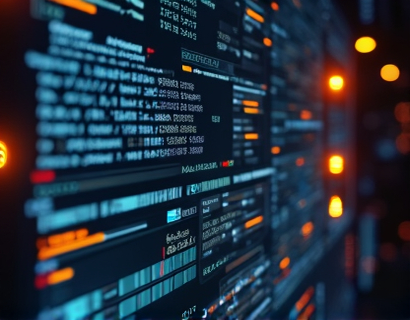Unlocking Financial Innovation: Harnessing AI and Crypto for Next-Gen Digital Transformation
The financial industry stands at the precipice of a revolutionary transformation, driven by the powerful convergence of artificial intelligence (AI) and cryptocurrency. This synergy is not just a trend but a fundamental shift in how financial services are delivered, experienced, and innovated. As tech enthusiasts and financial innovators, understanding this convergence is crucial for navigating the future of finance. This article delves into the intricate ways AI and crypto are reshaping financial services, opening new digital opportunities, and paving the way for a more efficient, secure, and inclusive financial ecosystem.
The Intersection of AI and Cryptocurrency
The integration of AI into the crypto space is multifaceted, impacting various aspects from trading and security to user experience and regulatory compliance. AI algorithms can analyze vast amounts of data in real-time, identifying patterns and making predictions that traditional methods cannot match. In the context of cryptocurrency, this means more accurate market predictions, enhanced fraud detection, and personalized financial services.
One of the most significant applications of AI in crypto is in trading. AI-driven trading bots can execute trades at optimal times, based on complex algorithms that consider multiple variables such as market trends, news sentiment, and historical data. These bots operate 24/7, providing an edge that human traders often cannot match. For instance, machine learning models can predict price movements with a high degree of accuracy, allowing for automated trading strategies that maximize returns and minimize risks.
Enhancing Security with AI
Security is a paramount concern in the crypto world, and AI plays a crucial role in fortifying defenses against cyber threats. Traditional security measures often struggle to keep pace with the evolving tactics of hackers. AI, however, can adapt and learn from new threats in real-time, providing a more robust defense mechanism. For example, AI-powered systems can detect unusual patterns in transaction data, flagging potential fraud before it occurs. This proactive approach significantly reduces the risk of financial losses and enhances user trust in crypto platforms.
Moreover, AI can improve the overall security of blockchain networks. By analyzing network activity and identifying anomalies, AI can help prevent attacks such as 51% attacks or double-spending. Smart contracts, which are self-executing contracts with the terms directly written into code, can also benefit from AI. AI can ensure that smart contracts are free from vulnerabilities by conducting thorough code analysis and simulating various scenarios to identify potential risks.
Personalized Financial Services
The combination of AI and crypto enables the creation of highly personalized financial services. Traditional banking systems often struggle to offer tailored solutions due to the high costs and complexity involved. AI, however, can process individual user data to provide customized financial advice, investment strategies, and product recommendations. This personalization enhances the user experience and increases customer satisfaction.
For instance, AI-driven financial advisors can analyze a user's financial history, risk tolerance, and investment goals to suggest optimal portfolio compositions. These advisors can also monitor market conditions and adjust portfolios in real-time, ensuring that users always have the best possible exposure. Additionally, AI can help users manage their crypto assets more effectively by providing insights into the best times to buy or sell based on market analysis and personal financial goals.
Streamlining KYC and Compliance
Know Your Customer (KYC) and compliance are critical aspects of the financial industry, but they can be cumbersome and time-consuming. AI can significantly streamline these processes, making them more efficient and user-friendly. AI-powered systems can automate the verification of user identities, reducing the manual effort required and minimizing the risk of human error. This not only speeds up the onboarding process but also enhances the security of user data.
In the crypto space, compliance with regulations such as Anti-Money Laundering (AML) and Countering the Financing of Terrorism (CFT) is essential. AI can help financial institutions and crypto platforms comply with these regulations by continuously monitoring transactions and identifying suspicious activities. Machine learning models can be trained to recognize patterns indicative of illegal activities, allowing for swift action to be taken. This ensures that platforms remain compliant while maintaining a seamless user experience.
Innovative Payment Solutions
The integration of AI and crypto is also revolutionizing payment solutions, making them faster, cheaper, and more accessible. Traditional payment systems are often slow and expensive, especially for cross-border transactions. Cryptocurrency, combined with AI, can offer a more efficient alternative. AI can optimize transaction routes, reduce fees, and enhance the speed of payments by analyzing real-time data and adjusting parameters on the fly.
For example, AI can predict the most cost-effective and fastest routes for cross-border payments, taking into account factors such as network congestion, transaction fees, and exchange rates. This results in a more seamless and cost-effective payment experience for users. Additionally, AI can facilitate the development of decentralized finance (DeFi) platforms that offer innovative payment solutions, such as decentralized exchanges and lending protocols, which operate without intermediaries, reducing costs and increasing accessibility.
Enhancing User Experience
The user experience in the financial sector is being transformed by AI and crypto. Traditional financial services often require users to navigate complex interfaces and undergo lengthy processes. AI-driven chatbots and virtual assistants can provide instant support, answering queries and guiding users through transactions in a conversational manner. These AI assistants can operate 24/7, ensuring that users receive help whenever they need it.
Moreover, AI can enhance the user interface of financial applications by personalizing the experience based on user behavior and preferences. For instance, AI can recommend relevant financial products, display information in a user-friendly format, and even predict user needs before they are explicitly stated. This level of personalization not only improves user satisfaction but also increases engagement and loyalty.
Challenges and Considerations
While the potential benefits of AI and crypto in finance are substantial, there are also challenges and considerations that must be addressed. One of the primary concerns is regulatory uncertainty. The rapid evolution of crypto and AI technologies often outpaces existing regulations, leading to a gray area where compliance can be challenging. Financial institutions and platforms must stay informed about regulatory developments and ensure that their AI and crypto solutions comply with current laws and standards.
Another challenge is the technical complexity involved in integrating AI and crypto. Developing robust and secure systems requires expertise in both areas, which can be a barrier for some organizations. Additionally, there is the issue of data privacy and security. While AI can process vast amounts of data, it is crucial to ensure that user data is handled ethically and securely, adhering to privacy regulations such as GDPR.
The Future of Finance
The convergence of AI and crypto is not just a passing trend but a fundamental shift in the financial landscape. As these technologies continue to evolve, we can expect even more innovative applications and use cases. The future of finance will likely see the rise of decentralized financial systems, where AI plays a central role in managing and optimizing transactions, risk assessment, and user interactions.
For tech enthusiasts and financial innovators, the opportunities are vast. By embracing AI and crypto, they can be at the forefront of this transformation, developing solutions that enhance financial inclusion, security, and efficiency. The next generation of financial services will be characterized by intelligence, automation, and decentralization, creating a more equitable and dynamic financial ecosystem.
In conclusion, the integration of AI and crypto is reshaping the financial industry in profound ways. From enhancing security and personalization to streamlining processes and innovating payment solutions, the potential is immense. As we move forward, it is essential to address the challenges and embrace the opportunities presented by this powerful convergence. The future of finance is bright, and those who harness the power of AI and crypto will be the leaders of this new era.










































